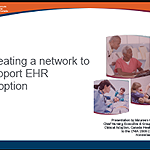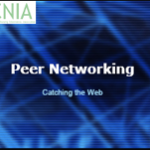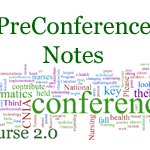Pre-Conference Workshop
Peer to Peer Networks
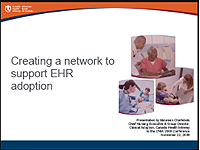 Our PreConference focused on Peer to Peer Networks and networking in general, and how they can work for Canadian nurses. Various models used to create these networks were examined, using an Appreciative Inquiry approach. The role of the CNIA and other Canadian nursing informatics experts in the development of nursing networks was discussed. Participants brain-stormed ways that nurses can collectively promote usable models within all provinces and territories across the nation.
Our PreConference focused on Peer to Peer Networks and networking in general, and how they can work for Canadian nurses. Various models used to create these networks were examined, using an Appreciative Inquiry approach. The role of the CNIA and other Canadian nursing informatics experts in the development of nursing networks was discussed. Participants brain-stormed ways that nurses can collectively promote usable models within all provinces and territories across the nation.
The pre-conference leaders offered their extensive expertise on the development of national and provincial initiatives, as well as ideas and suggestions for the role of social media networking for individual Canadian nurses.
PreConference Planners and Facilitators:
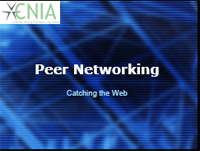 Maureen Charlebois RN, BscN, MHsc, CHE , Chief Nursing Executive and Group Director, Clinical Adoption, Canada Health Infoway
Maureen Charlebois RN, BscN, MHsc, CHE , Chief Nursing Executive and Group Director, Clinical Adoption, Canada Health Infoway
Expertise: Leader of National Nursing Networks (Peer to Peer) to support EHR adoption
Lynn Nagle RN, PhD, IMIA-NI Representative, Founding CNIA President
Expertise: National and International Nursing Informatics, Practice, Research and Educational networks
Elaine Hooper RN, ONIG Past President
Expertise: Provincial (Ontario) Peer to Peer Networks
Andrea Partridge RN, ONIG President
Expertise: Provincial (Ontario) Peer to Peer Networks
 Eithne Reichert RN, MN, CNIA President-Elect
Eithne Reichert RN, MN, CNIA President-Elect
Expertise: Provincial (Saskatchewan) Peer to Peer Networks
June Kaminski RN, MSN, PhD Candidate, CNIA President (absent due to illness)
Expertise: Social Media and Professional Networking (Practice, Research, Education)
Workshop Focus
- Various models of Networking, whether to facilitate workflow, knowledge, or meet requirements for systems and software implementation
- Sharing of Lessons Learned in each leader’s own context
- Cross Sharing on national, provincial, jurisdictional levels of experiences, plans
- Connection is an important aspect of this work: “we don’t know what we don’t know”
Workshop Outcomes
- Brainstorm and strategize about how CNIA and other organizations can move this agenda forward
- Allow participants to feel like they are part of the plan and they can contribute to something bigger
- Collect resources that can support the group
Appreciative Inquiry Approach
 Frame the topic in an appreciative way, where we Discover and acknowledge the work that has been done thus far, Dream about the possibilities, Design a Plan, and Deliver that Plan into practice.
Frame the topic in an appreciative way, where we Discover and acknowledge the work that has been done thus far, Dream about the possibilities, Design a Plan, and Deliver that Plan into practice.
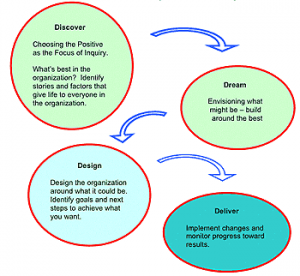
Questions Considered by Participants
Q1. Consider what is the impact of E-Health on the Nurses and their practice/role.
Q2. What challenges/barriers are significant? What knowledge or skills are significant?
Q3. Consider whether the standard for safe care requires the use of technology in nursing practice.
Q4. Is this a future skill/knowledge to be learned for all? If so, how?
Q5. Consider all the models, frameworks and programs for networking.
What would be some of the design elements to network nationally as well as locally?
Q6. Consider the current Nursing Informatics groups/networks and other organization’s directions.
Q7. Is there specific actions/activities that must be done? Should be done? Could be done?
Workshop At A Glance
Network models (Infoway, Provincials, Nurse One)
How to incorporate networking into nurses’s professional and personal lives
How can Provincial and Jurisdictional groups strengthen numbers and boost involvement?
How to connect the dots to build that Web
Improve awareness of eHealth
Workshop Process
Ten minute presentations by each facilitator as introduction
Presentations by facilitators, then form small groups with a mix of roles and jurisdictions
Smsll groups then come up with key strategies, including steps: a, b,c
Come up with “Recommendations that Provincial bodies and CNIA should….”
Tap the collective wisdom of the group to come up with a viable Action Plan.


